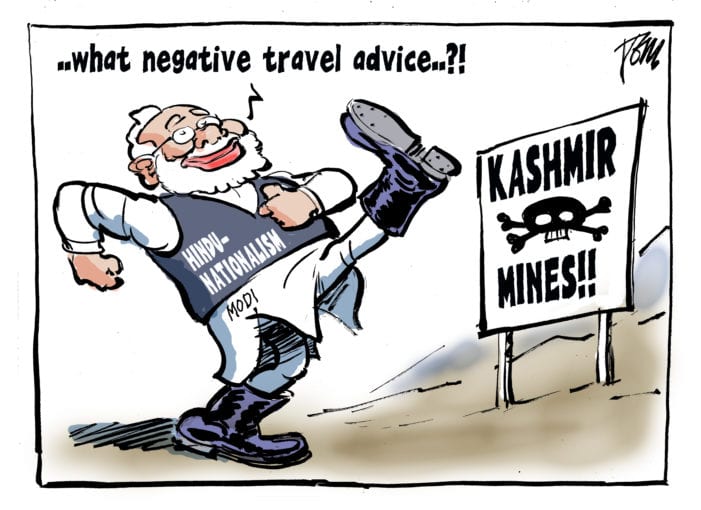Spectacles of the Demolition of the Babri Masjid in Uttar Pradesh and the Revocation of the Autonomous Status of Kashmir: Instances of Mass Hysteria and Bacchanalian Disorder
BY NYLA ALI KHAN
 While the conflation of religion and politics by the ruling party of a “democratic” and “secular” India gnaws at those of us who are invested in pluralism, those Indian-Americans who are closely aligned with the upsurge of Hindutva nationalism geared up to welcome Prime Minister Modi in Houston on Sept. 22.
While the conflation of religion and politics by the ruling party of a “democratic” and “secular” India gnaws at those of us who are invested in pluralism, those Indian-Americans who are closely aligned with the upsurge of Hindutva nationalism geared up to welcome Prime Minister Modi in Houston on Sept. 22.
These transnational subjects, safely ensconced in the United States, are unaffected by the wreckage caused by Modi’s demonetization and other economic policies, so they have become uncritically loyal to the romanticized notion of the nation.
Despite the creation of a new global order, transnationalism has led to the politicization of identity in the form of fundamentalism, xenophobia, and a fanatical espousal of tradition.
It is increasingly doubtful that transnational practices are generally counter-hegemonic. On the contrary, transnationalism enables the fortification of nationalist ideology. That couldn’t be more obvious than it is today with Hindutva groups in the United States supporting Prime Minister Modi’s arbitrary revocation of the autonomous status of Jammu and Kashmir, which is being celebrated by the Bharatiya Janata Party [BJP] and its cohort as the fruition of a promise made by its precursor, the Praja Parishad.
I would argue that cultural and religious fanaticism, legitimized by the ruling party of India, has emphasized a conception of identity between the “authentic” majority and “demonic” minorities.
This is not the first time that trasnational politics have led to the subjection of minorities – Muslims, Christians, and Dalits in India – to a centralized and authoritarian state bolstered by nostalgia of a “glorious past.” Transnational identities of Hindutva groups in the United States are related to the invention, transmission, and revision of nationalist histories.
The transformations associated with the phenomena of transnationalism and fundamentalism that we are witnessing with the rise in Indian-American supporters of Prime Minister Modi’s Hindutva nationalism can be exemplified by the Ram Janmabhoomi agitation of 1989 and the revocation of the autonomous status of Jammu and Kashmir as well as the curbing of civil liberties and rights in the former state, particularly the Kashmir Valley.
A disused 16th century mosque in Ayodhya, the Babri Masjid, was demolished by Hindutva supporters of the Rashtriya Swayamsevak Sangh and Bharatiya Janata Party who hoped to construct a temple, the Ram Janmabhoomi, on that site. Hindu-Muslim riots swept Northern India in the wake of the Ram Janmabhoomi agitation. In the case of the majority Hindus, the militant Hindutva ideology that the Ram Janmabhoomi movement incited challenged the principle of democracy.
The religious chauvinism that was manifested during this dark period in the history of India was transformed into bigotry supported by transnationals in the U.K. and the U.S. Bigotry defined identities and ideologies, treating the idea of a democratic and secular nation as if it were a myth.
By blatantly advocating and supporting the destruction of the Babri Masjid, the Bharatiya Janata Party and its votaries negated the legislation of the Supreme Court of India that sought to protect the site by staying its appropriation by any political party. The legislation was not only abrogated by the active mobilization of the fractious crowd, but by the bigwigs of the BJP who presided over the demolition of the mosque.
The spectacles of the demolition of the Babri Masjid in Uttar Pradesh and the revocation of the autonomous status of Kashmir were staged as instances of mass hysteria and bacchanalian disorder. In both instances, the devotees of the BJP across India and the Indian diaspora were spurred on by an overwhelming sense of celebratory hysteria.
Vis-à-vis Kashmir, the BJP’s Hindutva ideology justifies repression of dispossessed classes and other sections of the Kashmiri populace, objectification of Kashmiri women, and humiliation of the people with the language of affirmative action and good governance. The dominance of the fundamentalist order is valorized by the political party that enjoys a brute majority in the Indian Parliament.
There has been a backlash, propelled by the Hindutva lobby in the United States, against those Democrats, like Bernie Sanders, Ro Khanna, Pramila Jayapal, and Tom Suozzi, who have been critical of the Government of India’s policies in Kashmir.
While the complexities bred by transnational political, economic, and cultural practices can reinforce a nationalist and fundamentalist agenda, transnationalism can also have positive effects, which have been celebrated in terms such as multiculturalism, right to life and liberty, and freedom of religion by the founding fathers of the United States and India.
But given the rise in religious majoritarianism and cultural supremacist politics the world over, these sort of terms cannot be a stopping place for our thinking about a world radically transformed by struggles for autonomy and self-determination.
Nyla Ali Khan is the author of Fiction of Nationality in an Era of Transnationalism, Islam, Women, and Violence in Kashmir, The Life of a Kashmiri Woman, and the editor of The Parchment of Kashmir. She also has served as a guest editor working on articles from the Jammu and Kashmir region for Oxford University Press [New York], helping to identify, commission, and review articles. Nyla Khan is a Commissioner of the Oklahoma Commission on the Status of Women. She can be reached at nylakhan@aol.com.







